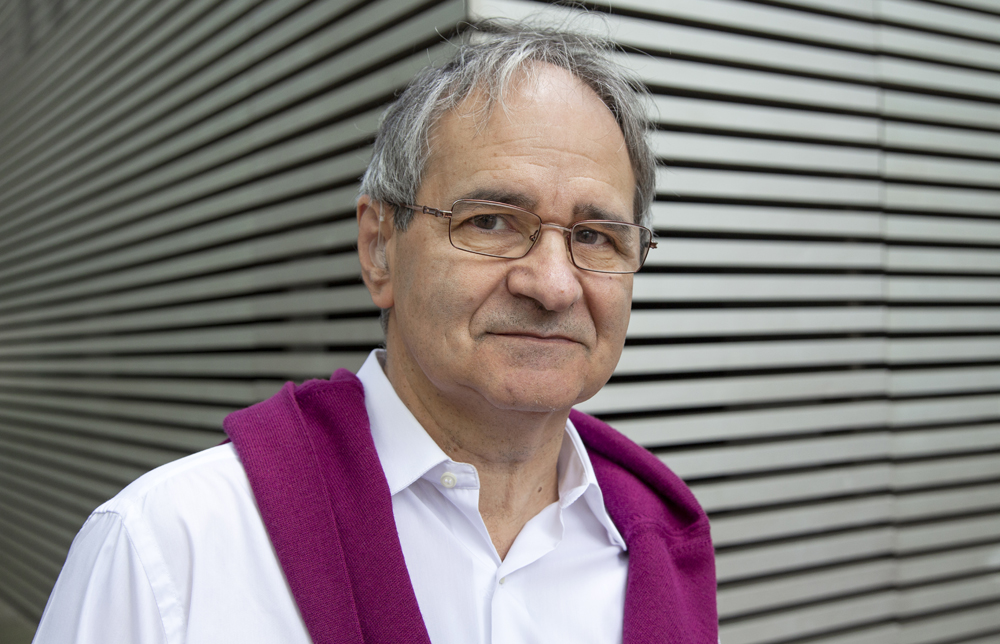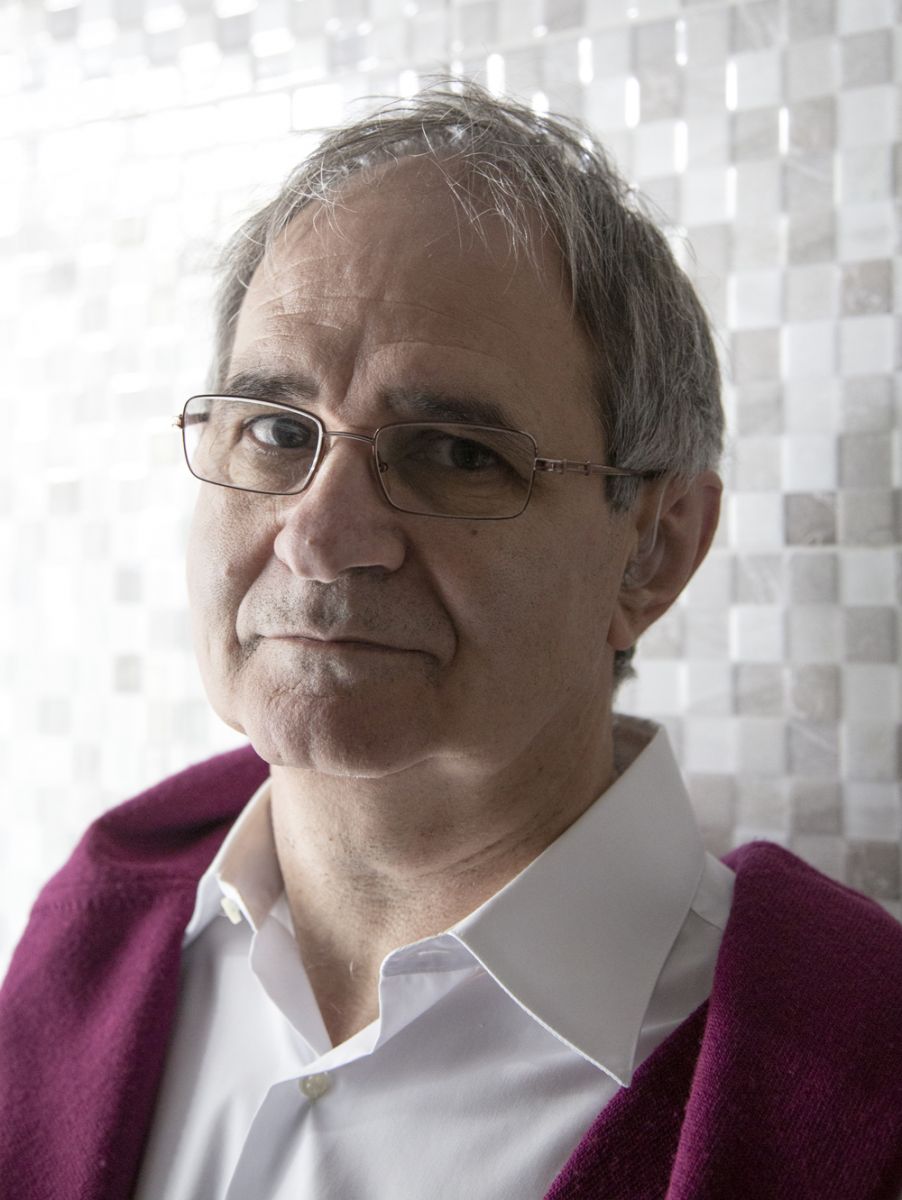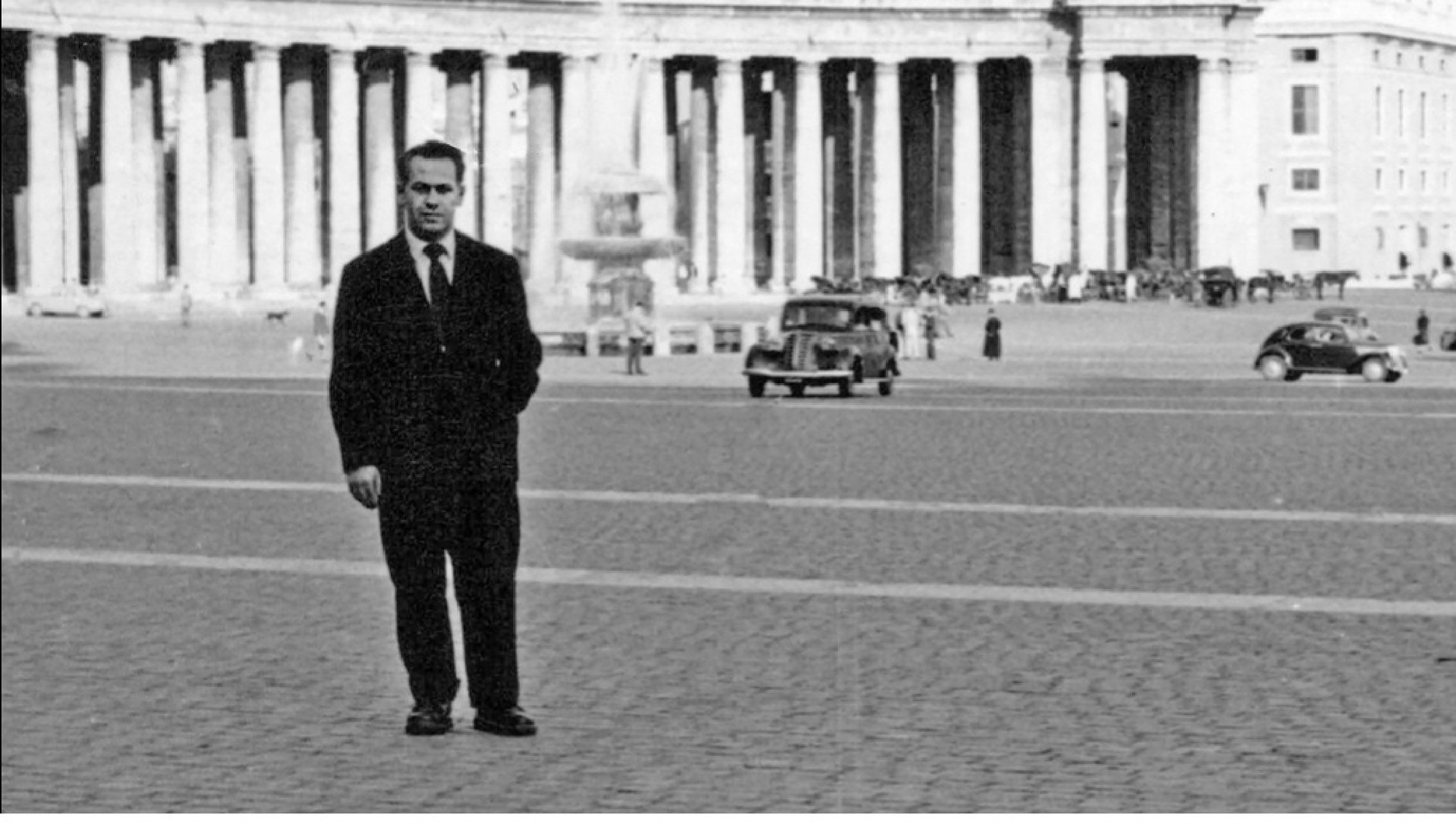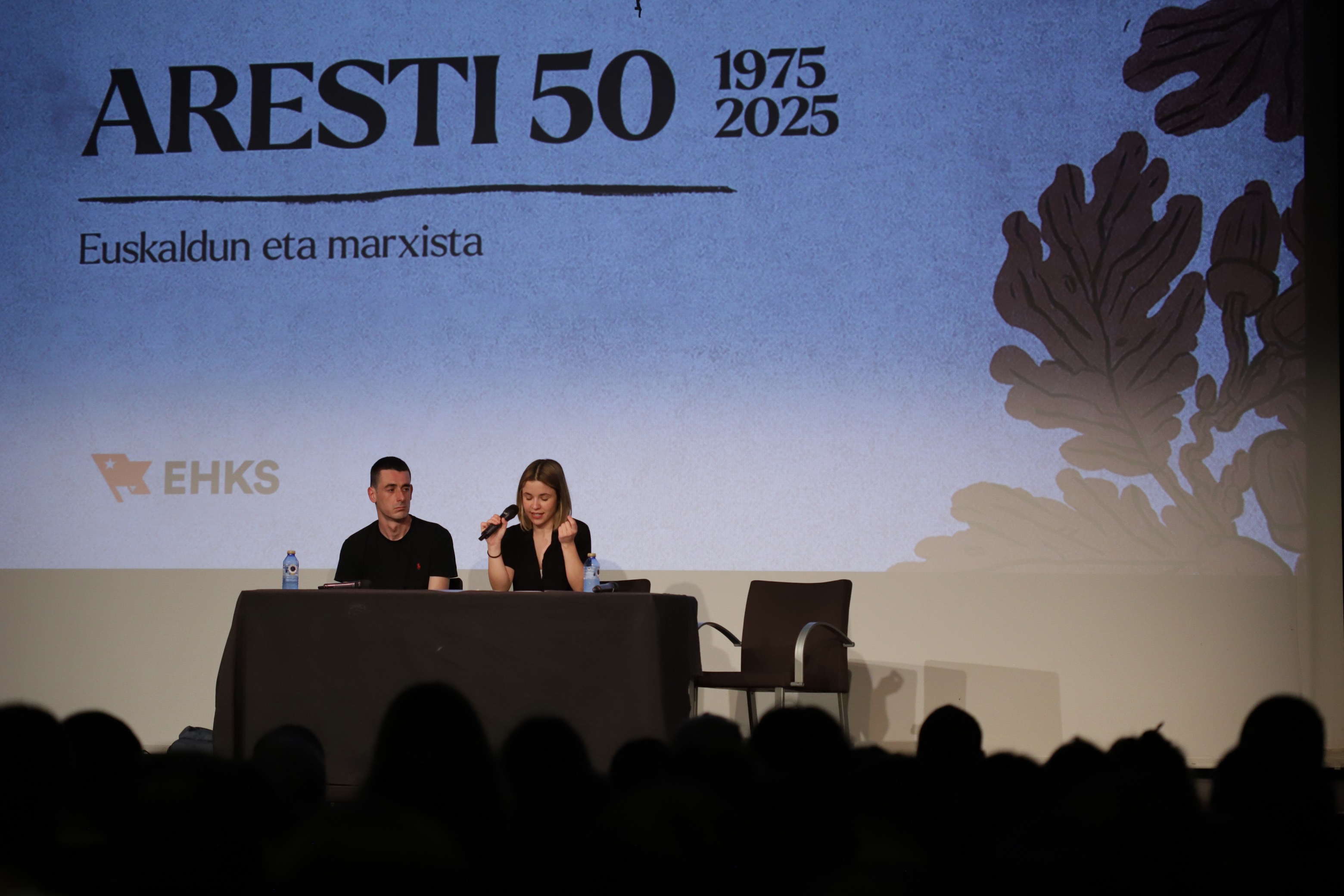"What happens has to speak, and not language."
- If there's a Bartlebyr in the Parajeos, that's Iñaki Irazu. Always between letters, but always from the shadow. He has published something in literary journals, the letters of many of Jabier Muguruza's songs are his own, but this year, at 64, he has published his first book of poems: Award of Mercy (Erein). Starting with speaking, the conversation has led us to issues relating to language registers, and we have not put a stop to it.

Before I start with the book, I have to ask you about you. You didn't have a hurry to go to the plaza, but once you've done it, you're left with a sense of fullness.
That's right. In my case this has been the time. When I retired from work, I felt the need to sort out the papers, I wanted to take away a lot of papers, and I started classifying them. Cioran said that when the artist does something, he always has an insecurity, a need for adulation, which makes him look at the opinion of others. By my nature, a little bit neurotic, I was constantly going through poems: you write one, you let it macerate, you read the little bit, and you apply your mind, reason. You start to change. He finally realizes he was OK from the beginning... That's how I walked. In addition, the creative process always comes from peace. And that's having free time, health -- psychological as well as physical -- humor ... Poems are made with the sense of age and the ownership of language.
Can't it come out of pain?
I see no contradictory pain and peace. The word always comes out of a wound. If I'm in a situation of grace, maybe I hear trikitixa, dancing and beba cidra. Nothing is generated from health and fullness. Watch the traditional songs: It was Pello Joxepe, Maitia non zira, Brodatzen... All those words are born from the wound. Peace does not mean that everyone does not have their wounds. But if I devoured the wound, if I can't resist it, I won't be able to tell you. He who takes over the wounds produces nothing. To my brother, Joseba Irazuz, that is, Bernardo Atxaga, it happened: as I wrote a book, a family problem has occurred and has been left blank for almost a week. If you want to express something, the world must leave it alone.
You mentioned your brother. He has worked in the literary world since very young, Garziarena, Zurgai, Erlea... Where were you in the meanwhile?
I was there ... I have my jobs, my duties and my march. To justify myself, I always say that poetry is not like a novel or an essay. When we go to the mountain and we're thirsty, we find an unexpected source, a spark of water. We are satisfied in that satire, it gives us terrible pleasure, and as a result we continue along the way. Chirrip also has two elements: water – satiate – and noise. With that image, I've explained. Anyway, about 25 years ago I was collaborating with Jabier Muguruza and I've got some poems out of several magazines -- Garziarena, Zurgai, Erlea -- often responding to my brother's step. He gave me a field.
“The process of creation always comes from peace. And that's having free time, health -- psychological as well as physical -- humor ..."
The Mercy Prize consists of three episodes. It has drawn my attention, especially in the first chapter, to how it has often turned the spotlight on Ni, such a common voice in poetry, to a third person. Many voices speak.
To give identity to the book, I've put the title: The prize of mercy and other chronicles. The chronic word serves mostly for the first part, but it crosses the entire book. Chronicles are stories, but they all have a presence: the author of the chronicle must be present. Sometimes Ni can be the third person, and sometimes it can be the third person a need for estrangement, because what is told is very hard. What is important in this way of understanding poetry? Detail. Those who have a chronicler instinct go in search of detail and, in addition, detail must have a meaning. A chronicle needs meat, it has to pay for itself, every word has to have meat. In this way, a voice appears in most poems. Words are born in the head, in the heart or in the stomach. The voices that appear there -- the seeds that give birth to the poem -- are born in the bowels. Then you add everything else: environment, history, place... For a plant to dominate the land, the water and the light properly.
But the chronicle gathers what happened in one place and a moment. It requires knowledge of the context. Haven't you felt the risk of making a mistake, of doing something that's not universal?
“The condition of the chronicler is to be there, but not very inside. If you're deep inside, you're not a chronicler, but something else. On the other hand, if you’re out, don’t experience it and you can’t tell it.”
It seems to me that perhaps in literature (and in art) the subjects are not so many. Solitude, death, love... At a given moment, how the character responds to fear, how love or heartbreak lives... It's true, whether it's chronic or not, that risk always exists, but that would be the book problem. On the other hand, there are some words that have a special force in universal culture. For example, the suitcase appears in a poem. In Greece, the suitcase is known as a metaphor. It is a word of great impact that indicates the importance of travel in the person's life. In another poem there is a hungry person, and inside is The Great Worm... he eventually starves to death. All of them, situations that can be found anywhere. Or torture appears, something that appears in the handbook of any policeman in the world. The question, however, is pretty: if there is a symbology in my poetry that addresses that universality. I think so. How many symbols do people have to see us, to understand us? I've read that somewhere aren't that many: the road, the tree, the sky, the clouds, the source -- the first images that we visually capture.
Many of the images of the poems, if not directly, are related to the Basque Thing: the prison, the institution, the whistleblower, or rather, the day of the murder of Yoyes.
Yes. The book brings together three emotional geographies, three different kitchens, each in one section. This socio-political environment around the conflict is, above all, the first. I'm not saying that when I was in second or third geography, the political environment was different, that I was in another geography. Why that environment? Well, as I lived, because I remember it. The condition of the chronicler is to be there, but not very inside. If you're deep inside, you're not a chronicler, but something else. Instead, if you're outside, you don't experience it and you can't tell it. I speak of them, because I have lived them, because for me they have been a presence. Very deep presence? No, but well, for example, I met Yoyes, he was a friend of his friends, he was once greeted in the old town...

Towards the end, Ni stands out more. And there's often a self that looks for beauty, or even that, surprised by beauty, looks at it. It was in the Castaño de Zubiondo or on the sidewalk, for example.
The poems of the songs belong to the last section, introduced at the request of the editor. I love you so much, you have another color. I would like you once again to enter that geography. They add to the book an element of chaos, and I like that I can't get to the book in a definition. Two important elements for reading poetry are related to chaos: time and mode. The moment of poetry and its form does not belong to a novel or an essay. A book of poems has not started and is finished to be read. You just have to read one or two poems at a time to pick up the shadow of that moment, if you have it, and put yourself in relation to yourself.
In general, they are poems written in a more or less flat style, in a narrative tone. I've read you don't care about brilliance. Why?
“My effort is to tell things. To do this, three conditions are needed: having something to count, knowing to count and wanting to count.”
My effort is to tell things. To do this, three conditions are required: having something to count, knowing to count and wanting to count. What is said is the same story. What happens has to speak and not language. Language does not need to be the protagonist, it has to be the assistant of the story, it has to limit itself to saying what happens. Use of metaphors and others? Well, sometimes yes. To give a unity to the story, when history has a lapse and something cannot be said otherwise.
As a reader, do you often find what you value in poetry?
I guess so. For example, I'm now reading Jane Kenyon, and in this tradition, there's simplicity, humility, narration. I mean, they count things. With the Basque literature, on the other hand, I am traveling to the crab, backwards. I've read Xabier Lete, for example, and well, he doesn't have a very narrative tone, but it's not abstract when he talks about his feelings. Or I've read bertsolari Pedro Mari Otaño. Or those verses in Uztapide's book, those of the old, are humble, but at the same time it counts things strongly. Now I'm with Gabriel Aresti, but he uses that strong tone in Harri eta Herri...
It's hard to believe.
The point is that it stays there: it's toning. It's time. For a moment, if I want to cheer, I read a poem of yours – I will die (...) / but my father's house / will last / standing etc.- and it's like a chute. Every book has its time, you choose when to read and when not. In me, there are no metaphors, subjunctives – let’s do, let’s go, let’s turn. That's another moment. Of prayer.
And has that moment, the moment of prayer, ever interested you?
“We need an economic language in which the silavic blows, the force and the gesture merge”
Yes, I have. Prayer is inevitable and stimulating. We are all born at one time or another. It serves to worship oneself. The point is that it's hard, because I get a "Lord" or a "You." But I'm not a believer, and I instantly hesitated. Who am I talking to? An Argentine writer said that to write sentences you don't need to be a believer. It was he who needed that dialogue. Another thing is, in the belief, the awe that can produce us. For example, I am now reading a newly dead poet, in the Fire with the Lord of Patxi Ezkiaga: Recalling Gandiaga. It's sentences. I bought it because Gandiaga was showing up. And yes, as in a ball, Gandiaga’s heads put his pocket on him, but then he loosen with the Lord – in capital letters. It comes to me from time to time, for example, when I use the word traveler. It happens that faith does not dry the word, it does not produce in poetry the slight fear, the shadow, the tremor that words need to reach inside. Anyway, I read a couple of times, I grab my pill and sleep wonderfully.
When writing, he has frequently used out-of-standard formulas: Me, Ne´ laguna, Bat´e, T´hala... What did you look for?
I couldn't resist laughing. It is not a mere whim, however. I have already said that mouths are born in the guts, and what comes from the guts is not served by the rules of academia. This voice comes to shock with the minimal syllable element. I cannot express a quick gesture in six syllables. Half of the syllables are left too much. In the drama, the gesture and the syllabus have to coincide. The academic record is fine, I have to start a philosophical thesis using bulls and rhetorical elements so that I can give time to understand what I'm saying. But in the drama, I need some high-speed, fluttering out, at a stroke. This neutral record often frustrates the drama. If I need a lot of syllables to say the same thing, I shake the gesture. If I say “I could no more” instead of “I could no more”, it’s for something. We say more in Spanish. One blow. In Basque I see an inflation of syllables. An extension of the sentence that goes against expressiveness.
To find a solution, you cut the syllables and, at the same time, the dialect inevitably appears. They won't say "Gehio" in Ibarrangelu.
Yes, that is the case. I don't know how it's said there, but I'm sure you won't use three syllables, you'll say "gehidxau," or something. In a poem commands the rhythm, the word is subject to the rhythm, even not depending on the author, but on a music. We need an economic language in which the shocks, the force and the gesture come together. And it's so obvious that there's a mismatch ... I see a lack of drama in films, in theatres -- in social traffic, dramatized narration is not reflected. Where do we hear him annoying? Anyway, the issue doesn't warm me up. If the editor tells me to replace the "ne" with "me," I'm not going to start war.
Now that everyone has become more Franciscan than the Pope, it’s worth remembering our unsurpassed classics. There was one in the 17th century, his grace was Arnaut Oienart. And since we can’t immerse ourselves in all his works, today we will praise O.ten youth in... [+]
Aurreko tertuliako galderari erantzuteko beste modu bat izan zitekeen, akaso modu inplizituago batean, bigarren solasaldi honetako izenburua. Figura literarioaz gaindi, pertsonaia zalantzan jartzeko, edo, kontrara, pertsonaiaren testuingurua ulertzeko saiakera bat. Santi... [+]
Astelehen honetan hasita, astebetez, Jon Miranderen obra izango dute aztergai: besteren artean, Mirande nor zen argitzeaz eta errepasatzeaz gain, bere figurarekin zer egin hausnartuko dute, polemikoak baitira bere hainbat adierazpen eta testu.
Martxoaren 17an hasi eta hila bukatu bitartean, Literatura Plazara jaialdia egingo da Oiartzunen. Hirugarren urtez antolatu du egitasmoa 1545 argitaletxeak, bigarrenez bi asteko formatuan. "Literaturak plaza hartzea nahi dugu, partekatzen dugun zaletasuna ageri-agerian... [+]
1984an ‘Bizitza Nola Badoan’ lehen poema liburua (Maiatz) argitaratu zuenetik hainbat poema-liburu, narrazio eta eleberri argitaratu ditu Itxaro Borda idazleak. 2024an argitaratu zuen azken lana, ‘Itzalen tektonika’ (SUSA), eta egunero zutabea idazten du... [+]























